May 27, 2020 | Civil Rights Law, Constitutional Rights, Police Misconduct
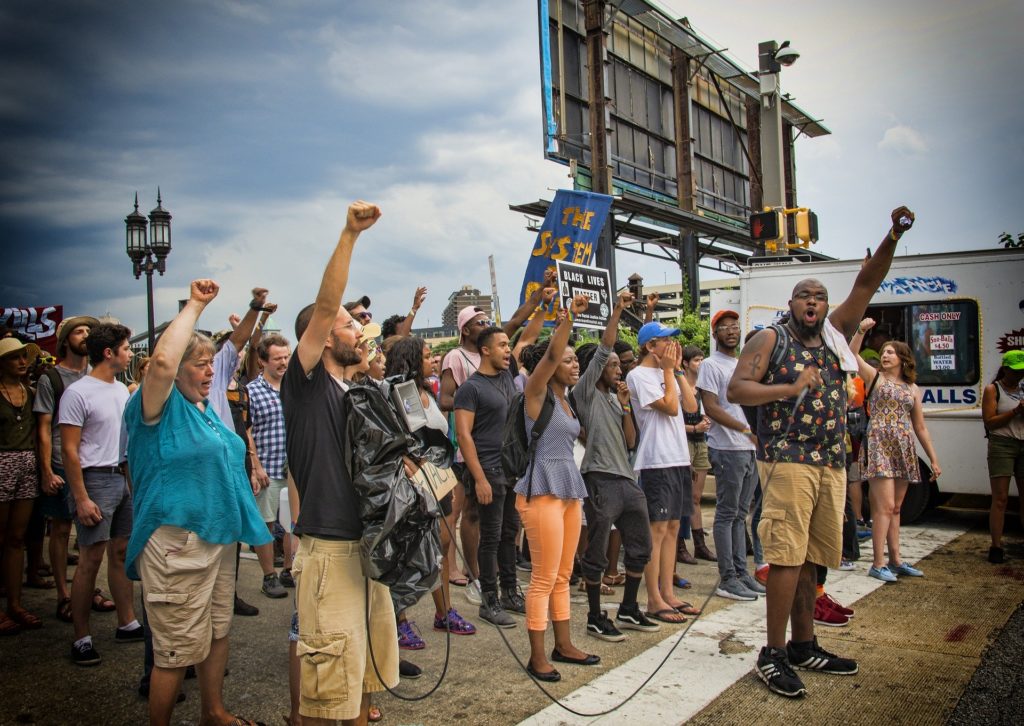 The most important thing to remember is that the First Amendment guarantees every person in America the right to peacefully assemble and protest.
The most important thing to remember is that the First Amendment guarantees every person in America the right to peacefully assemble and protest.
Congress shall make no law respecting an establishment of religion, or prohibiting the free exercise thereof; or abridging the freedom of speech, or of the press; or the right of the people peaceably to assemble, and to petition the government for a redress of grievances.
The right to protest is valued in our country and has led to many substantial changes over the past 200 years, such as the Civil Rights Act. When outrageous police abuse occurs — such as the killing of George Floyd in Minneapolis or the beating of Rodney King in Los Angeles — that conduct affects us all. Exercising your right to speak up and to protest could foster recognition, awareness, and much needed change in the future.
However, it’s important to remember that the Supreme Court has recognized limits to the exercise of our rights – when they could affect the rights of others. Just like freedom of speech doesn’t provide the right to publicly lie about someone or the right to yell fire in a crowded theater, the right to assemble does not mean that a protester has cart-blanche protection to commit otherwise illegal acts, such as vandalism, and there could be criminal repercussions for those who harm others.
Also, current law permits “reasonable time, place, and manner” restrictions by governments to limit some of the unintended adverse effects of those who gather to speak in local communities. Legal interpretations of what constitutes “reasonable” time, place and manner restrictions can be nuanced, but they usually permit municipal action to do things like restrict protesters from marching down the middle of busy streets or instituting non-discriminatory curfews to curb looting and vandalism. Protesters have more leeway regarding location and time when a protest is spontaneous, such as immediately after a major incident occurs that calls for public outcry, like the events in recent days. However, the protection for spontaneous association will likely be subject to greater “time, place, and manner” restrictions after initial protests erupt and/or after public safety concerns surface.
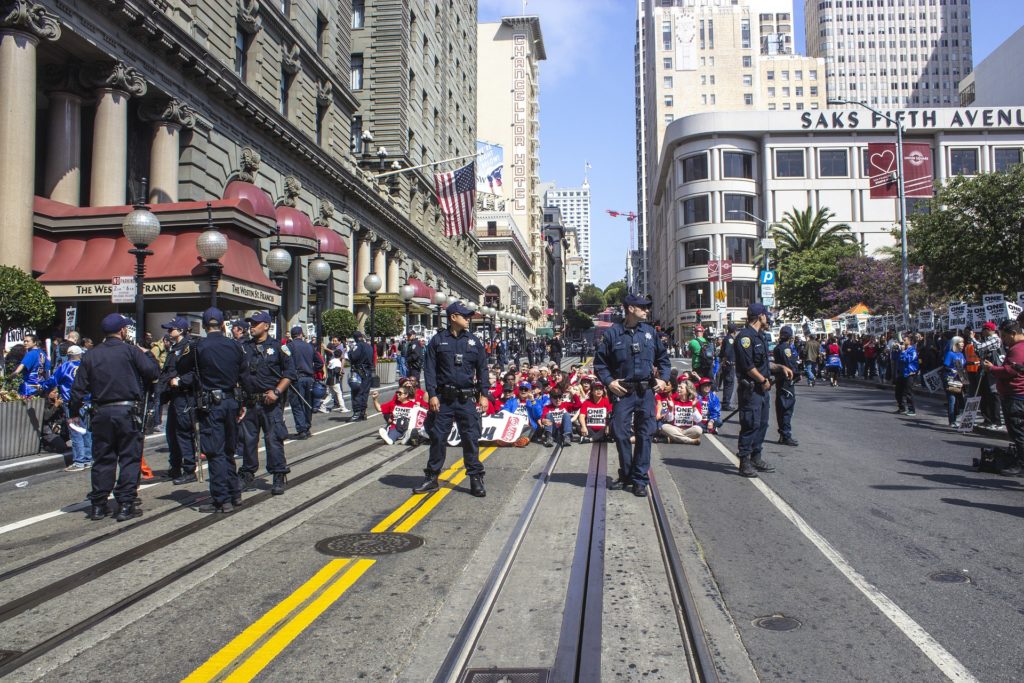
When can the police interfere with protests?
If a protest escalates to include violence and property damage, local law enforcement has the legal authority to intervene to quell that violence or to arrest perpetrators. They may also have the legal authority to stop protests on private property, those organized without a permit, or those that block public rights of way, such as on an interstate or major street.
As to the time or duration of protests, law enforcement can intervene if a curfew has been legally established and police have given you warning, time, and opportunity to safely leave. Police should act only to apply limited restrictions in a non-discriminatory and even-handed manner.
What am I allowed to record at a protest?
There have been a lot of contrary opinions written regarding what citizens can and can’t record, with respect to the police. And while some states have limits on where you can post recordings with audio, the visual part of recordings is protected by the First Amendment and can be posted online and shared.
You have a First Amendment right to record the police while they are performing public duties. As long as you aren’t interfering with or threatening them, and stay a fair distance away from officers performing official functions, the police DO NOT have the legal authority to demand that you stop recording. In fact, it’s always a good idea to record any encounter with the police if you think things might go bad for anyone involved. Phone recordings have been key in prosecuting police misconduct in recent years, especially with the quality of video that most cell phones can produce. As Will Smith said, “Racism isn’t getting worse, it’s getting filmed.”
Also, the police cannot legally demand your phone or confiscate it without a warrant, and those take time to obtain because they have to be signed by a judge. They also don’t have the authority to tell you to delete a photo or video. If you feel a confrontation may occur — especially one involving force — many have suggested complying, handing over the device, and then filing a complaint with Internal Affairs, the Office of the Independent Monitor (in Denver), or legal organizations like the ACLU or with local lawyers. But you absolutely have the right to retain possession of your phone along with any video or photos. If nothing else, quickly send or upload the media to someone before handing over your phone so that it cannot be deleted. The ACLU has developed a smart phone application that – once activated – will record and automatically upload any video taken from that phone to the ACLU for safe-keeping and later review:
https://www.aclu.org/issues/criminal-law-reform/reforming-police/aclu-apps-record-police-conduct
If you don’t like your own photo being taken or publicly shared, you should know that your presence at a public protest means you have given consent for your photo to be taken and potentially used, most commonly by the media. After-all, protests are meant to be matters of public interest. There are a few restrictions, but if you are uncomfortable with your photo showing up on social media or potentially the evening news, you should consider other forms of speech or wearing something that hides your identity.
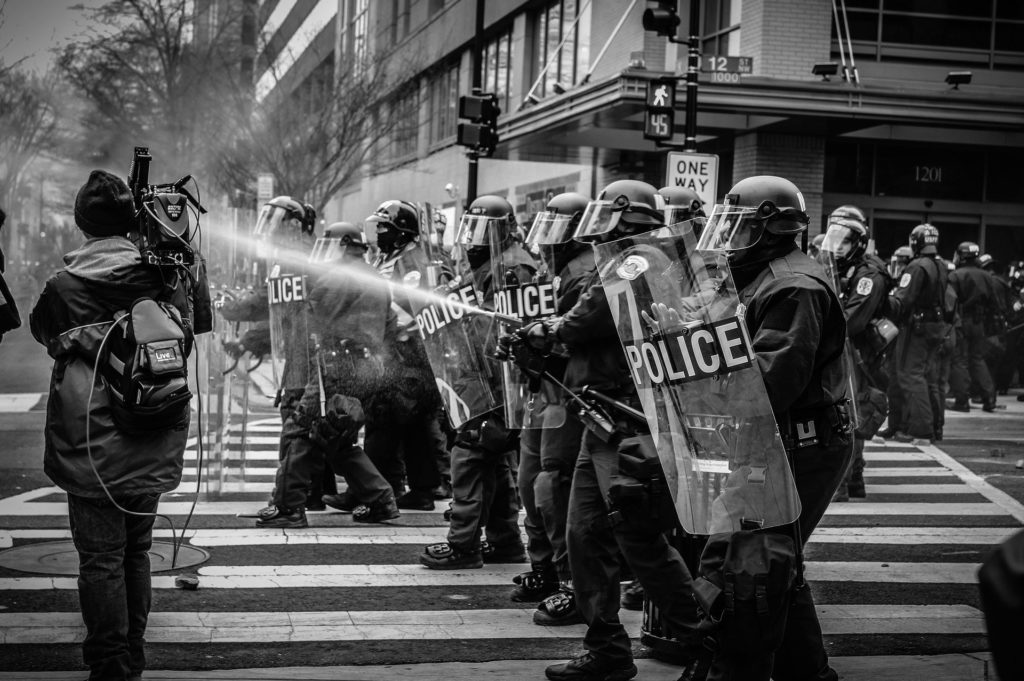
What are the police allowed to do during a protest?
The first job of the police is to protect your right to peacefully assemble — both they and public officials have taken a vow to uphold the Constitution. If you are acting reasonably, within the confines of the law, then they have no authority to act against you or restrain you in any way. However, they are also charged with maintaining order and upholding the law, so if protesters or infiltrators start being violent or causing damage then the police will most likely take action. The concern for all of us is what form that action takes and whether it is proportionate to the public policy and/or legal justifications permitted under the law.
The main priority of police should be to de-escalate violence, but it has been shown time and again that the police often are the cause of violence. For example, if they start dropping tear gas canisters and firing rubber bullets at peaceful protesters before curfew has started, and without any legal and/or legitimate purpose, then they could be found liable for use of excessive force. This is one of the times when it is important to always be recording police on your phone.
What should I do if the police stop me or if I get arrested?
First of all, it’s always good to stay calm. Remember that sometimes the police just want to ask a question and you may not be suspected of doing anything wrong. The law permits police to ask questions without converting the contact into a seizure. Second, get your phone out and start recording. Finally, you always have the right to ask the police if you are being detained and/or free to go. If they indicate you are not being detained or are free to go, just calmly leave — you are under no obligation to speak to them. If they detain you, you have the right to ask why you are being detained.
If you are arrested or detained — whether justified or not — it’s best to remain calm and not resist. If other people are there, ask them to record everything they can. You do not have to speak to the police if you don’t want to — you have the right to remain silent. After you are booked, you will have the right to make a phone call so it’s a good idea to write a few numbers on your arm since your phone will be taken away. And it’s always a good idea to call a lawyer because while that conversation is privileged, the police do have the authority to listen in on calls to friends or family.
What should I do if I feel my rights were violated at a protest?
If you truly feel your rights were violated, the first step is always to gather evidence to support you. You have the right to sue for the violation of your rights and you should contact a civil rights attorney devoted to your rights. 42 U.S.C. Section 1983 of federal law permits those who are violated by official government actors (such as police) to seek redress in federal court. However, police officers are also covered by qualified immunity, which means they are shielded from civil liability if they didn’t break a clearly established law. That is one reason it is so important to record any interaction with the police as many of them are still not required to wear body cameras. Recordings remove much of the grey area of “he said, she said” when courts are charged with determining who is telling the truth. Video doesn’t lie.
We are here to help with protecting your Constitutional right to protest
If you have experienced problems with your civil rights being violated during a protest, please give us a call. We work diligently to protect constitutional rights. For a free, no-obligation consultation with the Civil Rights Litigation Group, contact our Denver CO law firm today at (720) 515-6165 or use our online contact form.
May 22, 2017 | Civil Rights Law
We rely on the police for safety, but we also rely on the police to treat us fairly, regardless of race, color, national origin, sex, disability, and so on. In order to provide safety, Colorado police officers have broad powers to carry out their duties; however, there are robust Constitutional laws and other laws that place limits on this power and protect our civil rights.
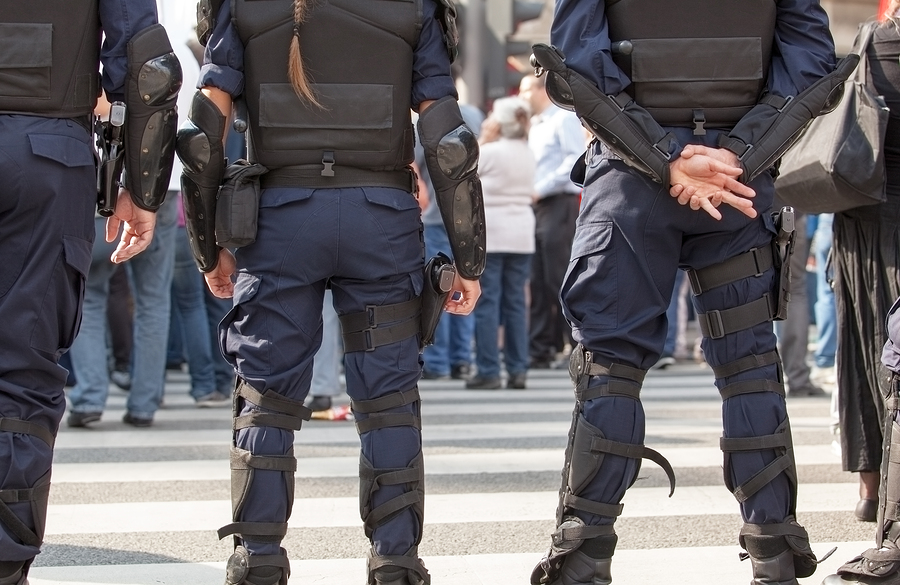
When police go too far, violating the civil rights of individuals in Colorado, the victim of the misconduct may have legal options. The first step in seeking justice and holding the responsible individual(s) accountable for their misconduct is to consult with a highly experienced Denver civil rights lawyer. At the Civil Rights Litigation Group, a civil rights law firm right here in Denver, we fully understand the complexity and the difficulty of these cases, as holding law enforcement accountable for misconduct, brutality, and excessive force requires a thorough knowledge of law as well as diligence.
Basics of police misconduct and qualified immunity
When stopped by the police for a suspected crime, it’s definitely an unsettling experience. Nevertheless, if the police officer is simply performing their job and not violating your civil rights, then the police officer is virtually immune from a civil rights lawsuit. Things like negligence and failing to exercise due care are, usually, insufficient for a lawsuit.
This is known as qualified immunity, and when bringing a police misconduct lawsuit to courts, the defense representing the law enforcement officer(s) will most likely raise a defense of qualified immunity. The short version of this legal doctrine is that it protects government officials (including police officers and law enforcement) “insofar as their conduct does not violate clearly established statutory or constitutional rights of which a reasonable person would have known.” In other words, you may have a lawsuit only when willful police conduct violates an existing statute and/or your Constitutional rights.
Federal statute for police misconduct and excessive force
Protections against police misconduct are thoroughly detailed in federal law, Title 42 Section 1983. According to this statute, it is unlawful for anyone acting under the authority of state law (in this instance, Colorado law) to deprive another person of his or her civil rights under the Constitution or federal law.
Your civil rights in a police misconduct case
In addition to Section 1983 and the claim you can bring to federal courts, it’s equally important to know your Constitutional and civil rights. Understanding these rights will be essential in a police misconduct case because, right from the beginning, you’ll be arrested and processed in Colorado’s criminal justice system. Some of the rights you should know include:
- Right to remain silent
- Right to refuse to consent to a search of yourself, your car, or your home
- If you are not under arrest, you have the right to calmly leave
- If you are arrest, you have the right to a lawyer
When arrested, make sure to remain calm and polite, don’t interfere or obstruct the police, and don’t lie or give false documents. Furthermore, it’s especially important to assert your right to remain silent. DON’T immediately start yelling how you’re going to sue; in fact, if the law enforcement is afraid of a misconduct lawsuit, he/she may begin covering up the incident immediately, documenting everything that would be beneficial to their defense.
In other words, if you’re arrested or the police have violated your civil rights or another statute, it’s important to politely assert your right to remain silent and contact a civil rights lawyer immediately.
Common types of police misconduct in Colorado
There are many ways that police can violate your rights, and in recent years, many cases of police misconduct, wrongful death, and excessive force have made their way to the limelight. The most common police misconduct claims brought to courts under Section 1983 include:
-
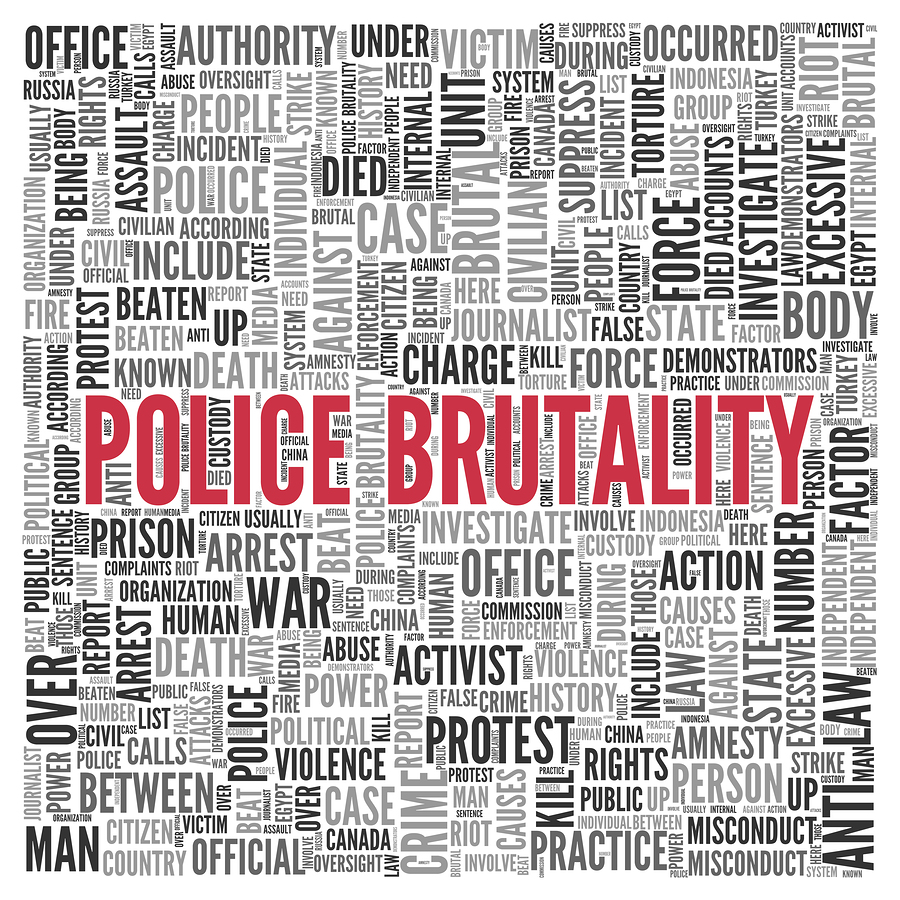 False arrest (false imprisonment) — The police violated your Fourth Amendment right against unreasonable search and seizure, but in order to have a “successful” case, you must show that the police didn’t have reasonable cause at the time.
False arrest (false imprisonment) — The police violated your Fourth Amendment right against unreasonable search and seizure, but in order to have a “successful” case, you must show that the police didn’t have reasonable cause at the time.
-
Malicious prosecution — The police violated your Fourteenth Amendment right to liberty. For these types of claims, you’ll need to show that 1) the police officer commenced a criminal proceeding, 2) the proceeding ended in your favor (not-guilty or dropped charges), 3) the police officer didn’t have probable cause, and 4) the criminal proceedings were brought with malice.
-
Use of excessive or unreasonable force — These cases often involve serious physical injury or death. Whether or not the police officer’s force was reasonable or unreasonable depends on the unique facts and circumstances of the instance.
- Failure to intervene — If an officer witnesses another officer violating your rights, and that first officer doesn’t do anything to help, then that officer may be complicit in the police misconduct case.
Fight for justice with the civil Rights Litigation Group in Denver
Civil rights claims are essential in our justice system, especially when upholding Colorado and Denver police officers to the law. Nevertheless, even if you felt that you were mistreated, the relevant police officers may be immune from a lawsuit. Police officers enjoy a wide range of protections. As a result, evidence supporting your claim will be absolutely fundamental, and if you were the victim of police misconduct, you need to contact a Denver civil rights attorney immediately so that valuable evidence does not disappear.
Contact the Civil Rights Litigation Group in Denver today for a free consultation. Don’t let the police get away with stark violations of your rights, and call our civil rights law firm today at (720) 515-6165.
Jan 6, 2017 | Civil Rights Law
The terms “good shooting” and “bad shooting” are in quotes for a reason — there are rarely “good shootings.” Even in some extreme circumstances, shooting to injure or kill should be a last-resort option when you feel threatened or that your life is in danger. From a police officer’s point of view, however, there is a difference between a justified, legal use of force and committing murder or, at the very least, manslaughter. These days, the police shootings against unarmed African Americans has spawned widespread criticism across the United States, such as the Black Lives Matter movement. Police misconduct is a serious issue.

As a Denver civil rights and police misconduct attorney, it can be clear (in most cases) whether or not the police used force responsibly and legally, or if the police officer was too trigger happy and led to someone’s death. Nevertheless, many Colorado residents are unaware of some of the subtle and more nuanced legal definitions that separate “good” and “bad” shootings. In this post, we’ll attempt to clear up some of these misunderstandings. In the meantime, if you or a loved one was shot by police, you shouldn’t hesitate; call the Civil Rights Litigation Group in Denver CO today at 720-515-6165.
Colorado police misconduct and the use of deadly force
Colorado police officers have several options when dealing with a potentially deadly, or even dangerous, suspect, and whether the police officer goes for the TASER or their gun often depends on the officer’s intuition during these split-second decisions, even more so than any standard protocol. Nevertheless, the rise of unjustified police shootings shows that “intuition” can lead to wrong decisions, resulting in police misconduct and an individual’s death.
Colorado law authorizes police officers to use force in specific situations, such as to carry out an arrest or prevent a suspect from escaping. Police can also use force to defend themselves or another person from the use or imminent use of force. The degree of force, however, depends on the unique circumstances of the situation, whereas deadly force may be justified when it is met with deadly force. For instance, deadly force may be justified when a suspect is committing a felony that involved the use or threatened use of a deadly weapon.
Deadly force, in virtually all cases, is not justifiable when the suspect is committing a misdemeanor. Colorado law makes it a crime for a police officer to use excessive force, which occurs when a police officer continues applying physical force even though the suspect is unable to resist arrest.
Deadly force and a fleeing suspect
When a suspect is running away, that suspect is less likely to pose a threat, and a Colorado police officer is only justified shooting a fleeing suspect in very specific circumstances. For instance, the 1985 Supreme Court case Tennessee v. Garner better defined the so-called Fleeing Felon Rule. According to the ruling, officers cannot shoot unarmed, non-dangerous suspects out of concern that they may escape. Police may shoot the suspect if the police believe that the suspect will cause serious injury or death to the officer, other officers, or the public, if not apprehended.
It is always important to remember that Colorado law recognizes that police are sometimes put in potentially dangerous situations; for this reason, case law states that the police officer may judge whether or not the use of force was reasonable and necessary, and not the facts and circumstances of the situation, which may come to light later with perfect hindsight. Police misconduct is not always cut and dried.
Fight police misconduct with attorney Raymond Bryant
Whether a person is dangerous, and how dangerous that person is, is rarely easy to determine. Nevertheless, there are many laws in Colorado that differentiate a “good” shooting from a “bad” shooting. If you believe that a friend or a loved one was shot due to excessive force exhibited by the police, it’s essential to act as soon as possible and call Denver civil rights attorney Raymond Bryant. At the Civil Rights Litigation Group, we have the resources, experience, and legal insight to take on police officers when police misconduct has occurred. For a free, no-obligation consultation with an experienced civil rights attorney, call our Denver law office today at 720-515-6165.
 The most important thing to remember is that the First Amendment guarantees every person in America the right to peacefully assemble and protest.
The most important thing to remember is that the First Amendment guarantees every person in America the right to peacefully assemble and protest.




 False arrest
False arrest